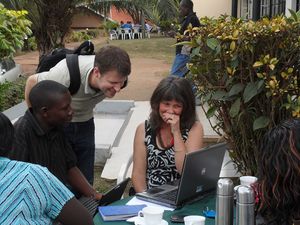Difference between revisions of "User:Dorothee Beermann"
| Line 13: | Line 13: | ||
A productive way to work together with other linguists on language projects is to create an annotation project on TypeCraft. Looking together at annotated text, discussing alternative glossing possibilities makes linguistic work fairly concrete. Besides the discovery of 'new' or 'unexpected uses' of familiar pattern is one of the bonuses that makes this kind of 'hands-on' linguistics fun. | A productive way to work together with other linguists on language projects is to create an annotation project on TypeCraft. Looking together at annotated text, discussing alternative glossing possibilities makes linguistic work fairly concrete. Besides the discovery of 'new' or 'unexpected uses' of familiar pattern is one of the bonuses that makes this kind of 'hands-on' linguistics fun. | ||
| + | |||
| + | |||
| + | |||
| + | |||
| + | |||
| + | [http://www4.clustrmaps.com/user/8abdaf33 http://www4.clustrmaps.com/stats/maps-no_clusters/www.typecraft.org-thumb.jpg] | ||
Revision as of 20:13, 21 September 2011
I am an associate professor in linguistics at the Norwegian University of Science and Technology. My field is syntax and lexical semantics. I teach mainly in formal linguistics where I am mainly interested in Lexical Functional Grammar and Head-Driven Phrase Structure Grammar, but in recent years I have started to give courses oriented towards Language Description and Documentation. I am interested in all questions concerning linguistic methodology.
Together with Pavel Mihaylov I have developed TypeCraft.
In recent years I have spent most of my time with project work. More about this work and about recent publications you can find on my homepage.
I try to spend as much time as possible with research and projects relating to TypeCraft.
I like to work with languages from different language families. I have worked on the Kwa-languages of West Africa, and on the Bantu language Ruyankore-Rukiga spoken in Uganda.
A productive way to work together with other linguists on language projects is to create an annotation project on TypeCraft. Looking together at annotated text, discussing alternative glossing possibilities makes linguistic work fairly concrete. Besides the discovery of 'new' or 'unexpected uses' of familiar pattern is one of the bonuses that makes this kind of 'hands-on' linguistics fun.


